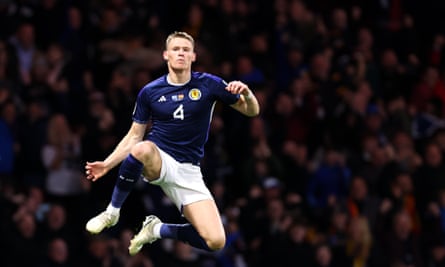In November 1984, Steve Clarke stood alongside his father on the north terrace of Hampden Park as a Scotland team inspired by Kenny Dalglish swatted aside Spain. Almost 40 years on, Clarke found himself at the helm of a result which is arguably even more impressive given the football paths subsequently taken by the nations in question.
Scotland, who sit proudly atop their Euro 2024 qualifying section, were fully worth their first win over the Spanish since Clarke was that paying punter. Two-goal Scott McTominay was the hero.
There will be an inquest, naturally, in Spain regarding the paucity of performance in Luis de la Fuente’s second game in charge. Yet the Scots, completely rejuvenated by Clarke, are worthy of huge praise. They already have next summer’s finals in Germany in their sights.
The draw between Georgia and Norway, confirmed before kick-off here, raised Scottish spirits. This is likely to be a tight qualifying section, in which the Norwegians have taken just a point from two matches. Scotland were once accustomed to such sluggish starts.
Euro 2024 qualifying roundup: Norway frustrated by Georgia
ShowIn the absence of the injured Erling Haaland, Norway were held to a demoralising 1-1 draw in their Euro 2024 qualifier with Georgia.
An early goal from Alexander Sørloth was cancelled out by an equaliser from Georges Mikautadze in the second half, leaving Norway fourth in Group A with one point from two games.
In Group D, Turkey lost 2-0 to Croatia thanks to two goals from Mateo Kovacic. It was Turkey's first game since the devastating earthquake which hit the country in February, with a giant banner expressing solidarity with those affected unveiled before kick off.
Meanwhile, in Group I, Kosovo had to settle for a point at home to Andorra after the visitors responded to Edon Zhegrova's opener with a goal from Albert Rosas.
Switzerland swept aside Israel 3-0 to top the group, while Romania beat Belarus 2-1 to go second.
The Tartan Army’s optimism levels rose even further within seven minutes. The national stadium’s playing surface, a talking point given persistent troubles, assisted the hosts as Pedro Porro slipped when trying to cut out a Ryan Christie pass. Andy Robertson stole in, the Scotland captain squaring for McTominay. Kepa Arrizabalaga will cite the deflection McTominay’s low shot took off Iñigo Martínez on its way into the net but he should still have done better.
McTominay’s goal, his third in just 13 minutes of international football, was reward for a high-octane Scotland start. John McGinn snapped at Spanish heels. Grant Hanley, Kieran Tierney and Ryan Porteous won their defensive battles. A visiting team showing eight changes from the weekend success over Norway – a matter which raised eyebrows – was struggling with Scotland’s intensity. Christie could and probably should have doubled the hosts’ lead after a bursting run from midfield. The Bournemouth midfielder prodded wide.
A Joselu header that hit the crossbar hinted at a Spanish awakening. Fuente’s men did gradually find their feet during a wonderfully frenetic opening period, without seriously troubling Angus Gunn in the home goal. Porro sought a red card for Robertson after the Liverpool full-back planted his shoulder into his opponent’s chin. Robertson escaped with a booking; a less lenient referee would have curtailed the 29-year-old’s night. Porro, now the pantomime villain, had his every subsequent touch vehemently booed. For all he embellished the incident, Robertson was silly to flirt with danger.
The half ended with a glaring Scottish chance. Robertson’s looping ball from defence found Dykes, who raced through on Arrizabalaga. The striker flicked high over the bar with Scottish fans awaiting goal number two. Such moments have a tendency to come back and haunt.

Porro was removed by Spain during the interval, presumably to spare him further public ridicule. The match referee, Sandro Scharer, took up position as the fourth official having suffered an injury. It was unclear whether this was to his ears, which would have been wholly understandable given the level of whining from those in red during the first 45 minutes. Scotland’s second goal owed everything to the tenacity of Tierney. The Arsenal man left Dani Carvajal, who had replaced Porro, for dust on Scotland’s left flank. Tierney’s cross was blocked by David Garcia but only as far as McTominay. The midfielder returned the ball first time and with interest, with Arrizabalaga rendered helpless. This suddenly had all the makings of a famous Scottish football occasion. Only the bar denied Scotland a 57th minute third from a swerving McGinn free-kick.
Spain were now in panic mode. Iago Aspas flicked over and Nico Williams shot tamely at Gunn after bamboozling Porteous. Amazingly, Fuente waited until the 79th minute to introduce Gavi. At this stage, the only serious danger to Scotland looked to be fatigue. Even tiredness could not deny Clarke’s men. The navy blue wall stood perfectly firm.

 1 year ago
82
1 year ago
82










 English (US)
English (US)